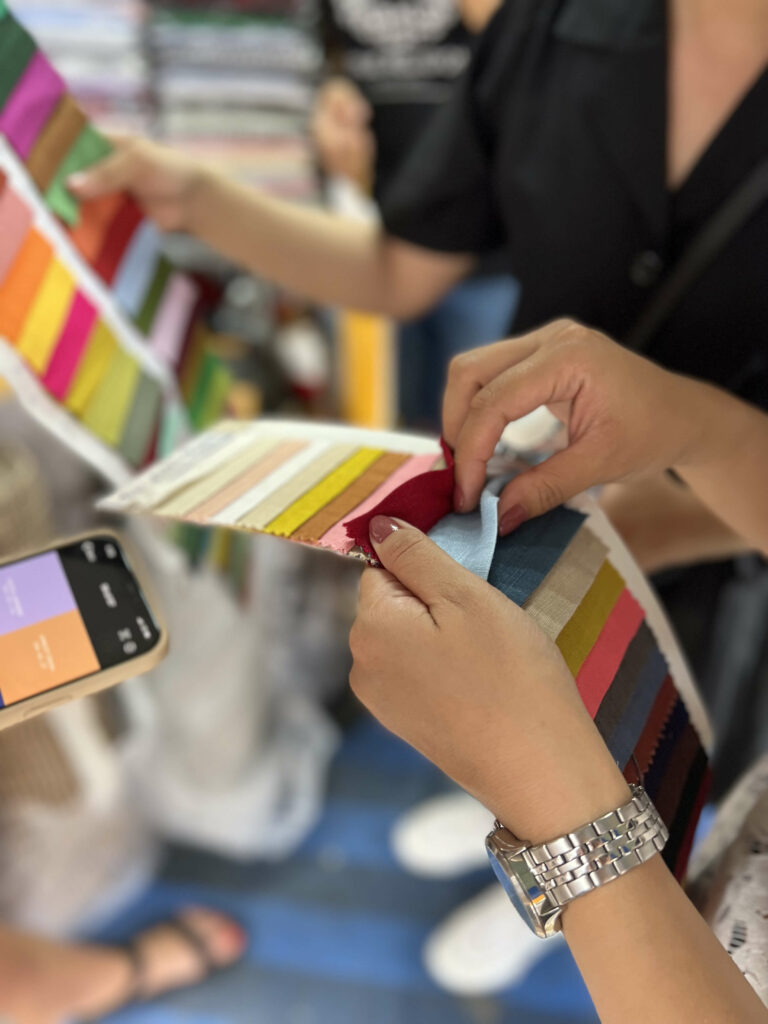
Our fabrics
TTK Collective is dedicated to promoting environmental sustainability and preserving the planet for future generations. To support this goal, we prioritize the use of eco-friendly and sustainable fabrics. These materials are not only better for the environment, but they also offer a number of benefits for our partners and their customers, including:
- Reduced Environmental Impact: Eco-friendly fabrics are produced with less harmful chemicals and processes, reducing their impact on the environment.
- Long-Lasting Quality: Sustainable fabrics are often more durable and long-lasting, meaning that they can be used for a longer period of time, reducing waste and the need for frequent replacements.
- Increased Comfort: Many sustainable fabrics are soft and comfortable to wear, making them ideal for clothing and accessories that are worn frequently.
- Better for Health: Eco-friendly fabrics are often free from harmful chemicals and toxins, making them safer for people to wear and reducing the risk of skin irritation and other health problems.
At TTK Collective, we believe that it is our responsibility to take care of the environment and minimise the toxic fabrics that we wear, and using eco-friendly and sustainable fabrics is just one way we are working towards this goal. We are committed to providing our partners with high-quality products that are both stylish and environmentally responsible.
Eco and Sustainable Fabrics We Love To Use
These are just a few examples of sustainable fabrics that we offer, and there are many more options available. It is important to carefully consider the entire lifecycle of a fabric, from production to disposal, when evaluating its sustainability impact.
Organic Cotton
Organic cotton is grown without the use of pesticides, herbicides, or synthetic fertilizers, reducing its impact on the environment and promoting healthy soil and ecosystems.
Tencel/Lyocell
Tencel or Lyocell is a man-made fabric produced from wood pulp sourced from sustainably managed forests. The production process uses less water and energy compared to traditional cotton production, and the closed-loop system recycles almost all solvents used.
Hemp
Hemp is a highly renewable and sustainable crop that requires minimal water and pesticides. The fabric made from hemp is naturally resistant to mold, UV rays, and pests, making it a durable and long-lasting option.
Linen
Linen is made from the flax plant, which is highly sustainable and requires fewer pesticides and herbicides compared to other crops. Linen is also biodegradable and compostable, making it an environmentally friendly option.
Recycled polyester
Recycled polyester is made from recycled plastic bottles, reducing the amount of waste in landfills and conserving non-renewable resources. The production process also requires less energy and water compared to producing virgin polyester.
Tussah Silk
Tussah silk is made from the cocoons of wild silk moths, making it a more environmentally friendly option compared to traditional silk, which is made from the cocoons of domesticated silk moths. Tussah silk moths are not bred or farmed, reducing the environmental impact of silk production.
Peace Silk
Peace silk, also known as Ahimsa silk, is produced without killing the silkworm. Instead, the cocoon is allowed to hatch and the moth emerges, producing a more natural and ethical product.
Lotus Silk
Lotus silk is a biodegradable and renewable fabric made from the fibers of the lotus plant. The lotus plant grows in water and requires no pesticides or herbicides, making it a more sustainable option compared to traditional silk. The production process also uses less water compared to silk production and the fibers are naturally strong and durable.
TTK Collective also places a strong emphasis on using deadstock and vintage silks
By using fabric that would otherwise go to waste, we are helping to reduce the environmental impact of textile production and contributing to a more circular economy.
Deadstock fabric is excess fabric that has been produced for a specific project or product but remains unused. This fabric often goes to waste if it cannot be sold or repurposed, but at TTK Collective, we are committed to finding new and creative ways to use this fabric and give it a second life.
Vintage silks, on the other hand, are beautiful, high-quality fabrics that have stood the test of time. By using these fabrics in our products, we are not only reducing waste, but we are also preserving the artistry and craftsmanship of past generations.
By using deadstock and vintage silks, TTK Collective is able to offer unique, one-of-a-kind products that are not only environmentally responsible but also have a rich history and cultural significance. We believe that by combining the best of both worlds – sustainable fabrics and vintage textiles – we can create products that are not only good for the planet but also have a timeless quality and style that will be treasured for years to come.
